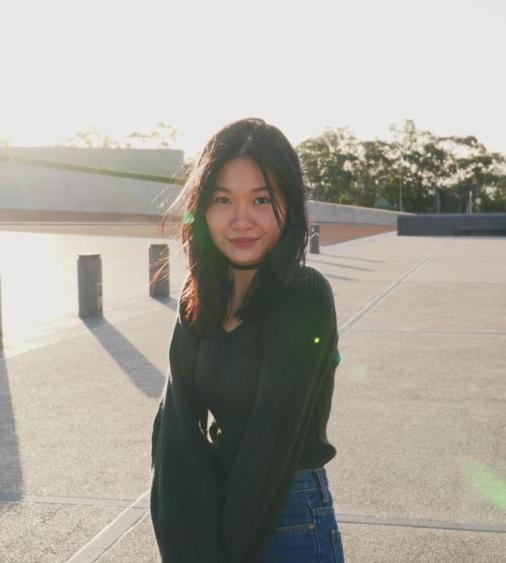Tell us a bit about yourself.
Hi, I’m Hui Er! I’m the creative director at The Hummingbird Co. and the co-founder of the online channel, Not Safe For TV (NSFTV).
My first love was actually the theatre. I went through the O and A level Theatre Studies and Drama programmes, which shaped my creative instinct and purpose. I eventually majored in broadcast in university and went on to pitch a web series, One Take, with my friend, Benedict Yeo, to this company called The Hummingbird Co. They offered us full-time roles to develop a content channel with them on which to launch the series, and the rest was history.
Looking back, the creative choices in One Take were quite reflective of my initial creative explorations: how to tell certain stories, why even tell stories (it’s so much effort and time and money), the difference between film and live theatre, and what kind of creative I want to be.
What motivated you to tell stories?
I believe we all innately tell and respond to stories. I’ve just been fortunate enough to make it a job. Who the stories are for really depends! I think sometimes the stories come first and then the team realises who the stories will impact the most and we streamline the story to that.
How long have you been telling stories about social causes and issues?
I didn’t set out to be all “I AM GOING TO TELL STORIES ABOUT SOCIAL ISSUES”.
I was influenced by my O Level drama teacher, Ms Noraini, who would grill us on why we chose the topics we did. She was very big on purpose. So I think it started when I was made to think critically about storytelling.
I remember watching plays by The Necessary Stage, a Singaporean non-profit theatre company, when I was young. Even at an age where I wouldn’t have understood the full extent of the issues they were tackling, their work resonated so much with me.
Making and experiencing stories like that made me care about things bigger than myself, and made me feel less alone. I experienced the power stories like that can have, and being moved by something made it naturally become a part of me and what I chose to do. It has become a way for me to say “Hey, this matters to me! Does it matter to you too?”
When we got to work on NSFTV, it was a very simple understanding that since we were given a platform, we might as well do something good with it.
What are some examples of stories on women’s issues and empowerment that you’ve produced?
I’ve noticed that I make creative choices, big or small, that reflect my beliefs on women’s empowerment in almost every project I do. I mean, I’m a woman, right? So my questions on femininity will always be at the front of my mind, and naturally, bleed into the things I do.
With One Take, we had two storylines, one on assault and the other on teenage pregnancy. In the series, Claire was navigating the impact of her intimate pictures being wrongfully leaked, and Alicia was figuring out how to make the best choices when faced with an unexpected pregnancy. These are easily classified as “women’s issues,” even though they are everyone’s issues really.
Then we had Girls Girls Girls, which came from a very personal place. It was something I knew intimately, a story of me and my best friends.

There are all these stories of iconic male experiences, for example, Ah Boys To Men, a popular Singaporean satirical comedy film about military service) but no one has told a girls’ school story before. It’s an intensely relatable experience, and I was amazed no one had attempted it before. I worked on it with the director Alexis; Girls Girls Girls didn’t have any big explicit “Women’s Issues,” they were just our truths. That was when I started asking: where are the stories from the female gaze?
Then there are the commissioned projects where I got to feature and celebrate pioneering feminists or discuss masculinity.
The one that I think did really well was a story for International Women’s Day. It was a simple day in the life video, where NSFTV showcased the little things we women do to protect ourselves, which is “normal” in society but is rooted in a deeply dangerous place. That resonated with a lot of people. It didn’t have any big message; it was just the truth. We were showing the everyday experience of being a woman.

Why was it important for you to tell these stories of safety/empowerment?
I never intentionally set out with the goal of telling stories about women. I had opportunities to tell stories and I gravitated towards those stories because they were my experiences. These are the struggles and joys I have and have witnessed. I know I am not alone in them - I believe these stories will resonate with others too.
Beyond telling these stories, I think what’s important is providing a platform for them. These stories already exist and what’s important is creating accessibility for them to reach an audience. We get to create conversations on our platform about such issues and receive plenty of support for them from our community. I’m wondering if these stories reach beyond people who already feel for the issue and, if not, how we might get these stories to them and in a way that they will be receptive to.
In general, do you think female filmmakers have to work harder to be noticed or heard?
I think I've had pretty positive experiences so far. But I do notice that I gravitate towards presenting myself less femininely when I feel like I need to command authority. And it’s something I’m working on, especially now that I'm in the position to - embrace my femininity and believing that it can co-exist with power.
Do you have any tips, advice, or encouragement for fellow like-minded filmmakers?
Keep telling your truth in the big strokes and the small choices.






